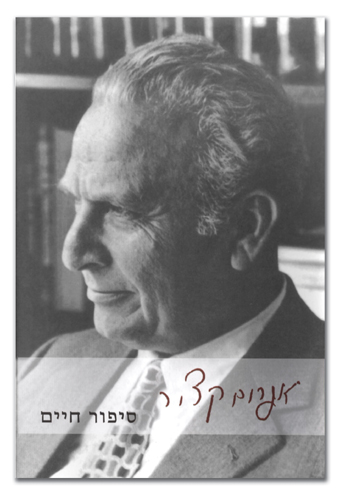Among the most important books to be published this year, the year of Israel’s 60th anniversary, is the autobiography of Prof. Ephraim Katzir – one of the founding faculty members of the Weizmann Institute of Science and fourth President of the State of Israel. Such a combination of science and statesmanship is rare – in the 60 years since the establishment of the State of Israel, there have been only two scientist presidents – Katzir and Dr. Chaim Weizmann. That they both came from the Weizmann Institute of Science provides testimony to the important part the Institute plays to this very day in the shaping of Israel.
The book gives an intriguing account of Katzir’s dramatic personal life, and Israel’s historic events, as well as a fascinating perspective on the advancements made in science – all woven together and revealing the underlying chronicles of the development of the State of Israel. In the beginning, science was drafted to ensure the survival of the young state; Katzir shares his personal memories about the development and acquisition of arms. But soon after, scientists began making contributions both to the economy and to the placing of Israel at the center of world science – an endeavor in which Katzir himself has played a significant role.
A particularly relevant chapter is dedicated to an account of the pioneering activities of Katzir and the contribution of other scientists to the field of science education – a field that continues to play a pivotal role in the activities of the Weizmann Institute of Science.
* Prof. Ephraim Katzir: Sipur Chaim (A Life Story), Carmel Publishing, is currently available only in Hebrew.
A Pivot of the Nation
Prof. Ephraim Katzir was born in Kiev, Ukraine, in 1916. His parents, Yehuda and Tsila Katchalski, brought him to British-ruled Palestine in 1922. Katzir enrolled in the Hebrew University of Jerusalem to pursue Ph.D. studies in biochemistry and organic chemistry, graduating in 1941. He continued his education at the Polytechnic Institute of Brooklyn, Columbia University and Harvard University.
While studying in Jerusalem, he participated in the first non-commissioned officers’ course given by the underground Haganah. Later, Katzir became deeply involved in the Israel Army’s Science Corps, Hemed, founded at the start of the 1948 War of Independence, and for a time he commanded it as a lieutenant colonel.
At war’s end, in 1949, Katzir and his scientist brother Aharon joined the Weizmann Institute. Ephraim founded and headed the Biophysics Department, while Aharon headed the Polymer Research Department until his tragic death at the hands of terrorists at Lod Airport in 1972.
Ephraim Katzir’s initial research centered on polyamino acids, synthetic models that facilitate the study of proteins. His pioneering studies contributed to the cracking of the genetic code, production of synthetic antigens and clarification of the various steps of immune responses. The understanding of polyamino acid properties led, among other things, to Weizmann scientists’ development of Copaxone®, a drug used worldwide for the treatment of multiple sclerosis.
In 1973, Katzir was elected fourth President of the State of Israel, a position he held until 1978. (It was upon becoming President that he changed his last name from Katchalski to Katzir.) During his term he paid special attention to the problems of society and education and was consistently concerned with learning more about all sectors of the population.
Upon completion of his term of office he returned to research at Weizmann, where he was awarded the Institute’s highest honor – the title of Institute Professor.
The magazine Annual Reviews once quoted Katzir as saying: “I have had the opportunity to devote much of my life to science. Yet my participation over the years in activities outside science has taught me there is life beyond the laboratory. I have come to understand that if we hope to build a better world, we must be guided by the universal human values that emphasize the kinship of the human race: the sanctity of human life and freedom, peace between nations, honesty and truthfulness, regard for the rights of others, and love of one’s fellows.”
